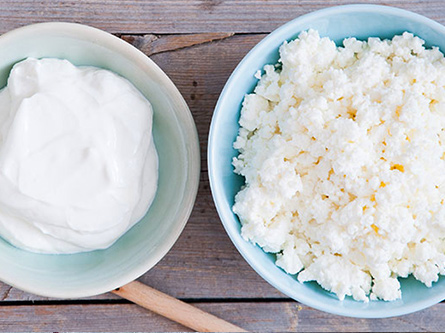
Cottage cheese and yogurt are both popular dairy products enjoyed worldwide for their versatility and nutritional benefits. While they share some similarities due to their fermentation process, subtle differences in taste, texture, and applications set them apart. This article delves into the nuances of cottage cheese and yogurt, exploring their distinct characteristics and helping you determine which one best suits your preferences.
This comprehensive guide will compare the taste and texture of cottage cheese and yogurt, examine their various uses in culinary creations, and analyze their nutritional profiles. By the end of this read, you’ll have a clear understanding of the key differences between these two beloved dairy staples.
Cottage Cheese vs Yogurt
Both cottage cheese and yogurt are produced through fermentation, where bacteria convert lactose (milk sugar) into lactic acid. This process gives both products their characteristic tangy flavor. However, the specific types of bacteria used and the production methods differ, resulting in distinct taste profiles and textures.
Cottage cheese is made by curdling milk with rennet or acid, then separating the curds from the whey. The curds are then rinsed and drained, giving cottage cheese its characteristic grainy texture. Yogurt, on the other hand, involves fermenting milk with specific bacterial cultures, resulting in a smoother, creamier consistency.
Taste Comparison

While both cottage cheese and yogurt share a tangy flavor due to fermentation, their taste profiles diverge significantly. Does cottage cheese taste like yogurt? Not exactly. Cottage cheese possesses a more savory, slightly salty note, often described as “earthy” or “buttery.” This savory undertone stems from the rinsing process during production, which removes some of the lactose and contributes to its unique flavor.
Yogurt, conversely, tends towards a sweeter, milder tanginess. The type of bacteria used in fermentation influences the yogurt’s flavor profile, with some varieties exhibiting fruity or tart notes depending on the added ingredients. Plain yogurt generally has a subtle sweetness that can be enhanced by adding fruits, honey, or granola.
Texture Differences
The texture of cottage cheese and yogurt is another key differentiator. Cottage cheese boasts a distinct grainy texture due to the curds remaining intact after the whey separation process. The size of the curds can vary depending on the type of cottage cheese, ranging from small and fine to larger and more noticeable.
Yogurt, in contrast, has a smooth, creamy consistency achieved through the breakdown of milk proteins during fermentation. This makes yogurt ideal for spreading, dipping, or blending into smoothies. Some yogurts may contain added fruit pieces or granola, which contribute to a slightly textured experience.
Uses and Applications

Both cottage cheese and yogurt are incredibly versatile ingredients with diverse culinary applications. Cottage cheese shines in savory dishes, salads, and dips. Its mild flavor complements vegetables, herbs, and spices, making it a popular addition to omelets, frittatas, and pasta salads.
Yogurt’s versatility extends to both sweet and savory applications. It can be enjoyed plain as a breakfast staple or incorporated into smoothies, parfaits, and sauces. In savory dishes, yogurt adds a creamy tanginess to dips, marinades, and dressings.
Nutritional Value
Cottage cheese and yogurt are both excellent sources of protein, calcium, and probiotics. Cottage cheese is particularly high in casein protein, which provides sustained energy release. Yogurt, on the other hand, boasts higher levels of whey protein, known for its rapid absorption rate.
Both dairy products contribute to bone health due to their calcium content. Additionally, the probiotics present in both cottage cheese and yogurt promote gut health by aiding digestion and supporting a balanced microbiome.
Conclusion
Cottage cheese and yogurt are both nutritious and delicious dairy products with distinct characteristics. Does cottage cheese taste like yogurt? While they share a tangy base, cottage cheese boasts a savory note and grainy texture, while yogurt offers a smoother, sweeter profile. Their diverse applications in both sweet and savory dishes cater to various culinary preferences. Ultimately, the choice between cottage cheese and yogurt depends on your individual taste and desired outcome.
